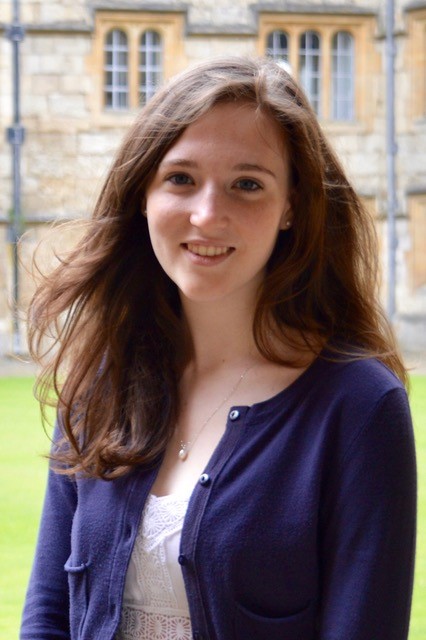Alumna: Katie Ratcliffe, South Square Scholar
Katie Ratcliffe was awarded the South Square Scholarship 2017-18
Name: Katie Ratcliffe
College: Merton
Scholarship: South Square Scholarship
I studied the BA in Law (Jurisprudence) and then the B.C.L. I am currently undertaking the BPTC at City Law School and teaching Land and Trusts Law part time at LSE. From September 2019 I will be a pupil at Essex Court Chambers.
I spent a week at South Square on an assessed mini-pupillage in September 2017. Among other things, I had the chance to attend two court hearings, one on an adjournment of a bankruptcy petition and one on the construction of a Tomlin order, and also researched various contract law issues for the barrister with whom I was sitting. My decision to study Corporate Insolvency Law on the BCL was partly influenced by the fascinating cases with which I was involved during my week at South Square. Having the opportunity to spend a whole week at a chambers, rather than one or two days, also gave me a much better insight into the day-to-day life of a barrister.
What impact did your scholarship have on you as a student and in your career?
Being awarded a scholarship for the BCL meant that I was able to spend less time the summer before the BCL working to save money for the BCL and more time doing preparatory reading, which made the transition to the BCL workload more manageable. The scholarship also gave me the confidence to apply for the commercial Bar. Without the confidence that such applications might not in vain, I would not have dedicated the necessary hours to writing applications and preparing for interviews.
What aspects of your law degree have proved to be the most useful in your post-Oxford life?
I found the Oxford BA and BCL rigorous both in terms of the length of the reading lists and the expectation that in a tutorial or seminar I would be able to discuss confidently a topic that a few days before was entirely new to me. For that reason, those four years taught me invaluable skills such as the ability to process material quickly and produce a coherent argument of my own, an essential requirement for a barrister. Equally, knowing that I had been capable of balancing my Oxford workload with my responsibilities as Merton Law President and Director of Productions for the commemoration ball, along with volunteering work and mooting, gave me the confidence during my BPTC year to commit to part-time teaching at LSE, research work, and a position on my Inn’s student social committee.
What did you enjoy most about studying law in Oxford?
The opportunity to moot against fellow Oxford students and at national level representing the university was the highlight of studying law at Oxford. Participating in the Philip C. Jessup moot was the first time I experienced the challenges of written and oral advocacy. I relished the difficult task of weaving complex academic writing and copious case law regarding mass surveillance and indefinite detention of terrorists into one coherent and persuasive argument that guided the judge through the material. Subsequent university moots enabled me to research a variety of areas of law outside of the core syllabus, ranging from certifications of asylum claims under s.94B Nationality, Immigration and Asylum Act 2002 (for the Legal Assistance Moot 2016) to disability law under the Equality Act 2010 (for the HSF Disability Moot 2016). Had I not had the opportunity to moot while at Oxford, I would never have discovered how much I enjoyed advocacy and would not have considered a career at the Bar.
Who was the biggest influence on you when you studied here?
When I arrived in Oxford I never imagined I would achieve anything higher than a 2.1 or that I would go to the Bar. A significant turning point for me came during the preparations for the Jessup moot. During practice rounds several PhD students acted as judges. When questioning us during our submissions, they made no allowances for the fact we were undergraduates without any detailed knowledge of public international law. Rather, they constantly pushed us to analyse the law and its policy foundations further, to evaluate the evidence more closely. Looking back on it, I feel very privileged to have had that opportunity to debate the law with experts in the relevant fields of public international and human rights law. At the time, however, it was a terrifying experience and made me realise that I was capable of a lot more than I had thought.
Later on the BCL, it was my peers who influenced me the most. Being surrounded by people enthusiastic to discuss and challenge each other’s views on law was exhilarating and the discussions in seminars gave me a chance to develop my own views properly for the first time rather than hiding behind academics’ theories. Once again I was pushed beyond what I thought were my limits and forced to have confidence in and defend my own opinions.
What advice would you give to a new or prospective student?
Involve yourself in as many extra-curricular activities as possible from day one. Your time at Oxford is brief and by your final year you will be too focused on exams to commit yourself to anything else fully. Everyone should try mooting, volunteering, and being on a committee while at Oxford as those activities give you transferable skills that studying in a library cannot. They also enable you to learn about yourself, what you enjoy and what you don’t enjoy. Be open-minded about trying new activities: very few people leave Oxford and go into the career that they had in mind when they arrived three years before and the more you understand what you like and dislike, the easier you will find deciding how you want to spend the rest of your life.

